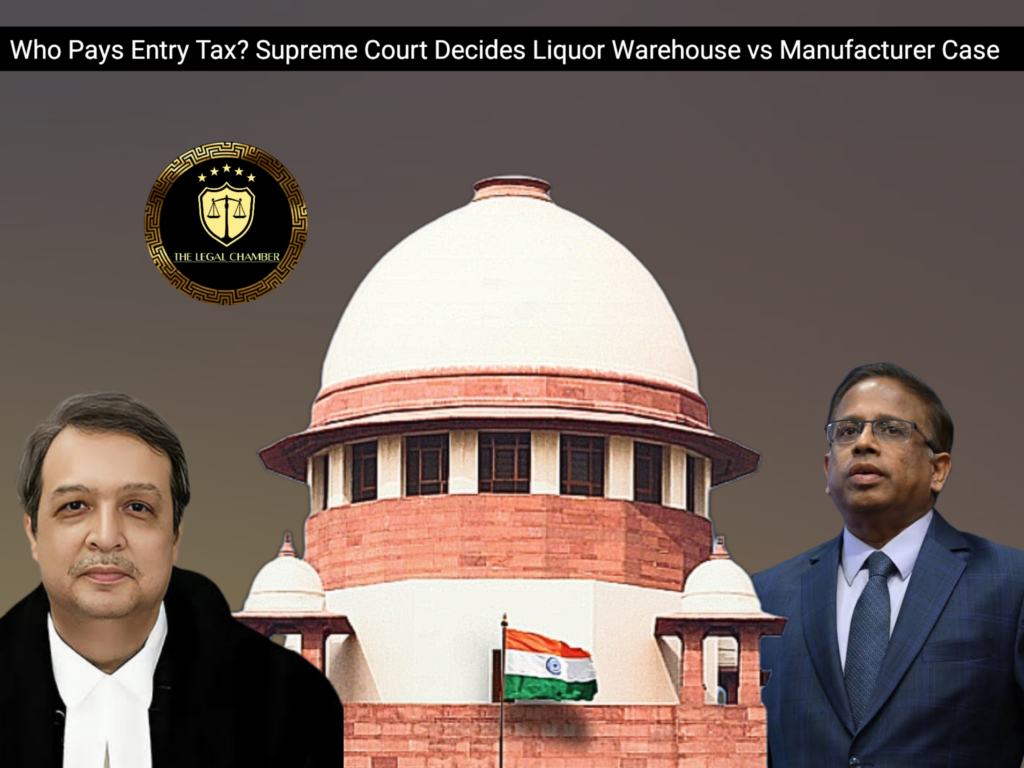
The Supreme Court upheld the levy of entry tax on liquor manufacturers under the Madhya Pradesh Entry Tax Act, 1976. It ruled that manufacturers “caused the entry of goods” into local areas under Section 3(1) read with Section 2(3), even through state warehouses. The Court clarified that Section 3B (special provision for liquor) was merely an enabling provision, and the absence of a notification under it did not bar tax collection under Section 14 (general machinery provision). The judgment affirmed that the tax liability rests on manufacturers, not warehouses, as they initiated the goods’ movement into the state.
Facts Of The Case:
The case involved M/S United Spirits Ltd. and other liquor manufacturers challenging their liability to pay entry tax under the Madhya Pradesh Entry Tax Act, 1976, for beer and Indian Made Foreign Liquor (IMFL) supplied during 2007–08. The appellants argued that they only supplied goods to state government warehouses, which then sold them to retailers, and thus, the warehouses—not manufacturers—should bear the tax liability. They emphasized that the warehouses issued sale bills to retailers, collected payments, and transferred the balance (after deducting taxes and fees) to manufacturers, creating no direct privity between manufacturers and retailers.The State of Madhya Pradesh countered that the warehouses merely supervised transactions and did not purchase or sell liquor, making manufacturers the actual dealers who “effected entry of goods” into local areas. The High Court sided with the state, prompting the appeal. The Supreme Court examined the transaction model, noting that while the warehouses acted as intermediaries, the manufacturers initiated the goods’ movement into the state. Applying Section 3(1) and Section 2(3) of the Act, the Court held that manufacturers “caused” the entry of goods, making them liable for entry tax. It also ruled that Section 3B (allowing special collection procedures) was optional, and the absence of a notification under it did not invalidate the levy under Section 14. The appeal was dismissed, upholding the tax on manufacturers.
Procedural History:
The case originated when M/S United Spirits Ltd. and other liquor manufacturers filed writ petitions before the Madhya Pradesh High Court, challenging the imposition of entry tax on them under the Madhya Pradesh Entry Tax Act, 1976. The High Court dismissed their petitions, upholding the state’s stance that manufacturers were liable for the tax. Aggrieved by this decision, the appellants approached the Supreme Court through civil appeals (Nos. 5113-5114 of 2025). The apex court examined the legal questions afresh, including the interpretation of key provisions like Sections 3(1), 2(3), 3B, and 14 of the Act. After hearing arguments from both sides, the Supreme Court delivered its judgment on July 14, 2025, dismissing the appeals and affirming the High Court’s view that manufacturers were liable for entry tax. The Court clarified important legal principles regarding tax liability in canalized transactions while rejecting the appellants’ contention about the necessity of a Section 3B notification for tax collection.
READ ALSO :Supreme Court Clarifies Jurisdiction of Electricity Regulators in Franchisee Disputes
Court Observation:
The Supreme Court made several key observations in its judgment. It noted that while the state government warehouses acted as intermediaries in the supply chain, the manufacturers were the ones who “caused the entry of goods” into local areas under Section 3(1) read with Section 2(3) of the MP Entry Tax Act. The Court emphasized that the statutory definition of “has effected entry of goods” included “has caused to be effected entry of goods,” making manufacturers liable regardless of the warehouse’s role.The bench rejected the argument that Section 3B’s non-obstante clause prevented tax collection without a notification, clarifying this provision was merely enabling and didn’t override Section 14’s general machinery for tax collection. It observed that the state’s model created two distinct transactions – between manufacturers and warehouses, and between warehouses and retailers – but this commercial arrangement didn’t absolve manufacturers of their tax liability. The Court also distinguished the present case from precedents cited by appellants, noting the statutory scheme specifically covered situations where goods were “caused to be entered” into local areas. Ultimately, it held the levy on manufacturers was legally justified under the Act’s provisions.
Final Decision & Judgement:
The Supreme Court dismissed the appeals and upheld the levy of entry tax on liquor manufacturers under the Madhya Pradesh Entry Tax Act, 1976. In its final judgment delivered by Justices J.B. Pardiwala and K.V. Viswanathan on July 14, 2025, the Court ruled that manufacturers were legally liable for the tax as they “caused the entry of goods” into local areas under Section 3(1) read with Section 2(3) of the Act. The bench rejected all contentions raised by the appellants, including their argument about the necessity of a notification under Section 3B, holding that Section 14’s general provisions for tax collection remained fully operative. The Court affirmed the High Court’s decision while clarifying that the state government warehouses’ intermediary role did not transfer tax liability away from manufacturers. No costs were awarded, and the civil appeals stood dismissed, settling the legal position that liquor manufacturers must bear the entry tax burden for goods entering Madhya Pradesh’s local areas during the disputed period (2007-08).
Case Details:
Case Title: M/S United Spirits Ltd. vs. The State of Madhya Pradesh & Ors. Citation: 2025 INSC 833 Appeal No.: Civil Appeal No. 5113 of 2025 Date of Judgment: July 14, 2025 Bench: Justice J.B. Pardiwala & Justice K.V. Viswanathan
Download The Judgement Here